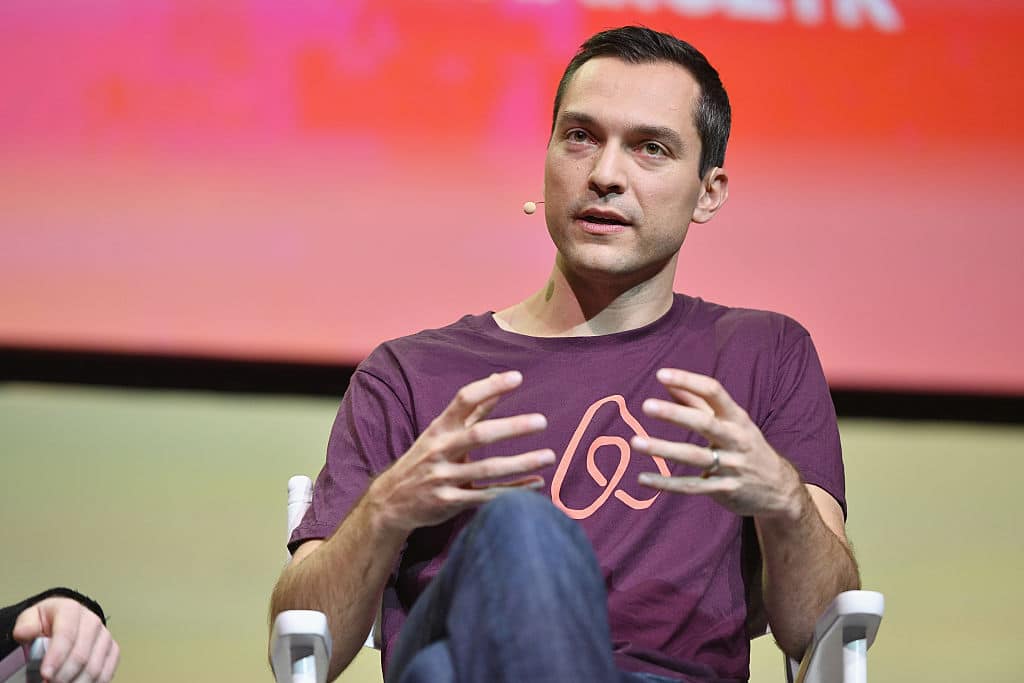Nate Blecharczyk, Airbnb’s technical cofounder, created the $110 billion home-share phenom’s software and marketplace blueprints. Now he’s using his engineering mindset and an army of data scientists to solve the company’s most challenging problems.
In the spring of 2020, Nate Blecharczyk, the cofounder and strategy boss of home-share giant Airbnb, was walking a tightrope.
The covid pandemic had rocked the foundation of Airbnb, one of the world’s fastest-growing and most valuable private companies. Overnight, millions of customers canceled bookings. New reservations vanished. Airbnb’s revenue dropped some 80%. To keep the lights on, the company raised $2 billion in emergency funding from existing investors. Now Blecharczyk’s cofounder and CEO, Brian Chesky, wanted him to turn around and give away $250 million to Airbnb’s hard-hit hosts. “Brian is a bold leader who’s always pushing you past your comfort zone,” Blecharczyk says and laughs. “He wanted to do something super substantial for hosts and felt that $250 million was the right magnitude.”
The magnitude did not sit well with Airbnb’s financial team, who were wary of unforeseen problems that could arise from Chesky’s version of economic stimulus. So once again, Blecharczyk, Airbnb’s tech-savvy cofounder, had to turn Chesky’s big idea into a workable plan.
Giving away $250 million to a potential 4 million hosts was trickier than it sounds. Airbnb needed a policy to deploy funds in a balanced way that didn’t concentrate the cash to too few hosts nor spread the money so thin that the gesture was meaningless. Optics for investors and the market—Airbnb was plotting an IPO—mattered too. After all, the company was handing out more than 10% of the money it had just rushed to raise. “How do we design a program that takes care of hosts and also has the right controls, so we don’t get over our skis in this time of great uncertainty?” says Blecharczyk.
Loading...
He dove into data and computer models, analyzing the number of canceled stays, forecasted upcoming cancellations, calculated the amount of revenue lost, and organized hosts by the strictness of their cancellation policies and size (small hosts got top preference). Model in hand, Blecharczyk deployed the $250 million in three weeks. More than 650,000 hosts were paid 25% of their lost reservation income. “I was the editor of the process, making sure that we weren’t making decisions prematurely and getting the team to think bigger,” says Blecharczyk. “I had to find the balance between Brian’s ambition to do something huge and translate into a specific program.”
Blecharczyk is Airbnb’s digital construction manager. His original title at Airbnb was head of all things technical, and over the last 13 years, he turned the ambitious ideas of his art-school-trained cofounders into functioning Airbnb products. CEO Chesky is the hard-charging leader who directs customer experience, fundraising and publicity. Cofounder Joe Gebbia is the artist who runs Airbnb’s new design studio Samara and its charity Airbnb.org. Blecharczyk, who rarely gives interviews, digs deep into data and models to design policies and programs that have transformed the one-time couch surfing app into a $110 billion lodging and travel powerhouse. As the company matures, he’s been busy building systems to beef up trust and safety. His latest project, City Portal, is a collection of tools and data dashboards meant to mend Airbnb’s often fraught relationships with local government leaders.
Airbnb’s leadership triple play has paid off. “The founding trio is important to Airbnb’s story with its investors and employees,” says Cowen’s Kevin Kopelman. “It’s clear they’re implementing their vision across everything the company does.” Since the dark days of the early pandemic lockdowns, Airbnb has surged. It acted fast to cut costs (it laid offer 25% of its employees in 2020) and has refocused its strategy away from pre-pandemic ventures like hotels and an airline. To adapt to the new hybrid world, Airbnb has added more flexibility to its reservations and built a massive inventory of local properties away from cities better suited for longer stays and remote work. In December 2020, Airbnb IPOed surging 112% on its first day of trading, and has climbed 13% since (the S$P 500 is up 27%). Airbnb has a market cap of $100 billion—more than Marriott, Hilton, and Hyatt combined. Thanks to the jump in shares, Blecharczyk boasts a $10 billion fortune.
Blecharczyk grew up in Boston’s West Roxbury neighborhood, where his electric engineer dad hooked him on computers early. At age 12, Blecharczyk was home sick from school when he found a programming book and taught himself simple scripts. Soon he was devouring 500-page Q-basic coding manuals, learning how to customize PC games like SimCity and Civilization. At 14, he started making digital marketing programs for businesses for $1,000 a pop. In high school, he designed a software program and started selling licenses—over five years, the basement-built business would pull in just under $1 million.
As an engineer, I’ve always been good at taking something that’s high level and abstract and boiling it down into a program.Nate Blecharczyk
By then, Blecharczyk was majoring in computer science at Harvard. The business taught him two valuable lessons. He could teach himself any tech skill he wanted, and could build products that people wanted. “It gave me tremendous confidence and set me on this path of entrepreneurship.”
After Harvard, he went to Opnet, a Washington DC enterprise software firm, building Windows-based applications for businesses. Bored with the projects and slow pace, he joined an education tech company in San Francisco. Blecharczyk met cofounder Joe Gebbia through an apartment listing in SF’s Soma on Craigs List. Soon he joined Gebbia and Brian Chesky in famed start-up incubator Y-Combinator creating a product that would help people book—and trust—a stay inside a stranger’s home. “As an engineer, I’ve always been good at taking something that’s high level and abstract and boiling it down into a program,” says Blecharczyk, “You must break the problem down into bits and pieces and take action.” Blecharczyk wrote the original code, built financial models, created Airbnb’s payment system, and hacked Airbnb’s growth into top markets.
Blecharczyk’s analytical process fueled Airbnb’s rapid market growth. Early on, the team was unsure whether to focus on increasing customers or home listings. Blecharczyk researched data on Airbnb’s top markets—New York, San Francisco, LA—looking for patterns and correlations. He hit upon two key insights. Listings drove demand, and once a city had more than 300 listings, something clicked, and the market would grow on its own. “By looking at the data very carefully, we refocused the problem. We simplified the goal from growing the company across the country to just getting 300 properties in the most important tourist cities.” The plan worked. Airbnb’s sprouted up in every major US city.
As Airbnb grew, Blecharczyk moved from engineering head to Chief Strategy Officer. “You should always strive to hire someone better to put yourself out of a role, especially in a fast-growing organization where there’s no shortage of things to do.”
That meant leading Airbnb’s expansion into China and building programs to address trust, safety, and city regulations. One project was a system to prevent the wild parties that have long caused Airbnb a repetitional hangover. Ragers, while rare, drew a disproportionate amount of press and attention. Again he dug deep in the data searching for patterns.
His analysis revealed that most bashes were thrown by guests under 25 who lived near the property and booked the home last minute. (Airbnb stayed mum on other factors). Airbnb created an algorithm to block high-risk rentals and set up a policy that puts restrictions on the properties that folks under 25 can rent. Parties have since declined. “Airbnb has incredibly high net-promoter scores, and our surveys show their customers are very satisfied and very happy,” says Cowen’s Kopelman. “As incidents have popped up on the platform, Airbnb has reacted with new policies, employees and processes to minimize negative dynamics on the platform.”
You should always strive to hire someone better to put yourself out of a role, especially in a fast-growing organization where there’s no shortage of things to do.Nate Blecharczyk
Blecharczyk recently built software to become friends with local governments, whose housing policies can make or break Airbnb’s business. Since its launch, Airbnb has been at odds with politicians about safety, regulation, housing supply, and taxes. Each conflict created a one-of-a-kind problem for Airbnb, sapping time, money, and resources. As laws and leaders often changed, Airbnb found itself playing an ever-expanding game of whack-a-mole.
To create a more uniform and efficient process, Blecharczyk gathered leaders across Airbnb’s divisions and spent a year creating a digital product with features that hundreds of local governments wanted most. Last fall, Airbnb launched its City Portal dashboard showing municipalities all the hosts in their area, from where Airbnb guests are traveling, the revenue hosts are collecting, and the dollars visitors bring to the economy. There are also tools that let towns give out permits, find illegal rentals, and hotlines to report violations.
Today more than 100 municipalities are on the system. Blecharczyk says that City Portal was controversial inside the company and having him run it showed players, both inside and outside Airbnb, it was a top priority. “We want governments to feel empowered and not frustrated with us,” says Blecharczyk. “It’s important for the long-term. As we become a significant platform globally, cities will want this level of control. It’s only a matter of time—best to be proactive about it.”
By Steven Bertoni, Forbes Staff
Loading...





















